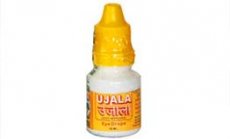Medical expert of the article
New publications
Preparations
Uzala
Last reviewed: 03.07.2025

All iLive content is medically reviewed or fact checked to ensure as much factual accuracy as possible.
We have strict sourcing guidelines and only link to reputable media sites, academic research institutions and, whenever possible, medically peer reviewed studies. Note that the numbers in parentheses ([1], [2], etc.) are clickable links to these studies.
If you feel that any of our content is inaccurate, out-of-date, or otherwise questionable, please select it and press Ctrl + Enter.

Ujala is a combination herbal medicine used in ophthalmology. The Ayurvedic medicine is produced by Hymalaja Chemical Laboratory Pharmacy (India), the composition of the medicine is patented.
Indications Uzala
The main indications for the use of Uzal include such ophthalmological pathologies as clouding of the lens and cornea of the eye, inflammation of the mucous membrane of the eye (conjunctivitis), lacrimation, abnormal growth of the conjunctiva on the cornea (pterygium), trachoma, and cataracts (including arrest of their development).
Release form
Release form: eye drops in a bottle.
Pharmacodynamics
The therapeutic effect of the drug Uzala is provided by the extract of the plant Boerhaavia diffusa and potassium nitrate dissolved in glycerin.
The perennial plant Boerhavia is common throughout Asia as a weed. According to Ayurveda, this plant has a number of unique biochemical properties and has long been used in this region of the world to treat many diseases.
This plant contains phytosterols, phenolic glycosides, isoflavonoids Boeravinone G and Boeravinone H. These biologically active compounds have analgesic, anti-inflammatory and antiproliferative properties.
The plant contains the alkaloid punarnavine, phytoecdysones (steroid substances) that have stimulating and adaptogenic effects, as well as a powerful antioxidant - xanthone boerhavin. These substances reduce the content of tissue lipid oxidation products, normalize cellular metabolism and restore plasma membrane cells.
Therefore, the drug Uzala has a positive effect on already damaged protein cells of the cornea, and also prevents or slows down their further coagulation – the main cause of cataracts.
Potassium nitrate, due to its moderate antimicrobial action, also prevents the proliferation and growth of bacteria.
 [ 1 ]
[ 1 ]
Pharmacokinetics
To date, the pharmacokinetics of Uzala have not been studied.
 [ 2 ]
[ 2 ]
Dosing and administration
The method of application and dosage of this drug is to instill one drop into the eyes twice a day (morning and evening). After that, it is recommended not to strain the eyes for 1.5-2 hours and avoid direct sunlight.
The duration of treatment is determined by the doctor; the average duration of cataract treatment is from three to five months.
 [ 5 ]
[ 5 ]
Use Uzala during pregnancy
There is no information regarding whether Uzala can be used during pregnancy.
Contraindications
Contraindications to the use of Uzal are: hypersensitivity to the components of the drug; age under 12 years; wearing contact lenses; the presence of corneal and eye lesions caused by viruses or fungi; mechanical damage to the conjunctiva, cornea or lens; increased intraocular pressure (including that caused by glaucoma).
 [ 3 ]
[ 3 ]
Side effects Uzala
Side effects of Uzala are possible directly when instilling drops - in the form of severe burning in the eyes and tearing. But, according to the instructions, this is normal, and you need to be patient. It is recommended to close your eyes and rest. At the same time, you can neither rub your eyes nor rinse them, since then the use of Uzala will not give a therapeutic effect.
Ayurveda experts advise using this medicine to consume less animal and vegetable fats, drink more water, and include more fresh vegetables, fruits, and greens in your diet. Otherwise, prolonged treatment with Uzala can lead to constipation.
 [ 4 ]
[ 4 ]
Overdose
There are no specific data on cases of Uzal overdose. A special antidote for overdose has not been developed.
To avoid unwanted effects, it is necessary to take into account the following recommendations:
- If you are using the medicine for the first time, start the therapeutic course with a minimum dosage (1-2 drops every 2-3 days), bringing the dose to standard norms over 7-10 days;
- If after using the drops there is persistent redness of the eyes (for several days), then the use of Uzala should be stopped and a doctor should be consulted;
- If the course of treatment with the drug is long, there is a risk of developing constipation.
Interactions with other drugs
It is not recommended to use other external eye medications simultaneously with Uzala.
The use of ophthalmic medications for internal use is not prohibited.
 [ 6 ]
[ 6 ]
Storage conditions
The drug must be stored in a dark place, at a temperature not lower than +8°C and not higher than +25°C.
Shelf life
The shelf life is 24 months (an opened bottle – no more than a month).
Attention!
To simplify the perception of information, this instruction for use of the drug "Uzala" translated and presented in a special form on the basis of the official instructions for medical use of the drug. Before use read the annotation that came directly to medicines.
Description provided for informational purposes and is not a guide to self-healing. The need for this drug, the purpose of the treatment regimen, methods and dose of the drug is determined solely by the attending physician. Self-medication is dangerous for your health.

